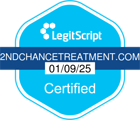
How to Help a Loved One Get the Addiction Treatment They Need

One in seven people in the United States lives with addiction, a complex and often chronic disease that gives rise to distorted thinking, behavior, and body functions through compulsive substance use.
Addiction is common among people of all ages and from all walks of life — it doesn’t discriminate based on gender, race, education level, or income status. In fact, addiction is so common across all spectrums of society that nearly half of all Americans have a family member or close friend with a current or past drug addiction.
While those statistics are certainly grim, it’s even more frightening to know that the chronic misuse of drugs and alcohol ranks as the leading cause of preventable illnesses and premature death in the US.
But it’s not all bad news. Fortunately, addiction is also a highly treatable problem that can be effectively managed with the help of health care professionals and the ongoing support of family and friends. Because encouraging your loved one to seek treatment can be tricky at best, it’s important to take the right approach. Make your appeal as compassionate as it is convincing with these useful strategies.
Get your timing right
Before you start contemplating how you’ll approach the subject of addiction treatment with your loved one, it’s important to figure out exactly when and where it’d be best for the two of you to have this highly personal conversation.
The way in which your loved one initially reacts to your thoughts, concerns, suggestions, and guidance can be, to a great degree, shaped and influenced by your overall timing. Approaching the subject when they’re in a bad mood, tired, stressed out, distracted, high, inebriated, or in withdrawal can leave you at a disadvantage, decreasing the odds that they’ll even want to hear you out.
You also don’t want to have this sensitive conversation in a group setting or in a situation where others can easily overhear what’s being said. Instead, approach your loved one when they’re unoccupied, calm, attentive, and in a relatively good mood, and aim to start a private, friendly conversation that helps them feel cared for, respected, and in control.
Express unconditional support
Even though the stigma surrounding addiction isn’t as strong or as widespread as it once was, it hasn’t disappeared completely quite yet. With that in mind, it’s vital to offer unconditional support — and demonstrate it with your actions — so your loved one knows, without a doubt, that you don’t blame them for their illness, and you truly care about their well-being.
To help them feel your unconditional support on every level, approach them with empathy, not judgment. Many people with addictive disorders know they need help but are afraid to seek it if they believe others will judge them or view them in a different light.
Keep your approach as gentle, caring, and nonjudgmental as possible by avoiding “you” statements and focusing on “I” statements whenever you can.
You might say, “I know this may be difficult (or uncomfortable) to hear, but I’m talking about it because I love you, and it seems like you’re having a really hard time right now.” Or you might say something more along the lines of, “I’m concerned about you, and I’d like to give you the kind of support I know you’d give me if I were in a similar situation.”
Make sure your loved one also knows that your unconditional support includes helping them find the right addiction medicine specialist. For someone in the throes of addiction, this task can seem overwhelming or even insurmountable. You can make the idea of seeking treatment less daunting by offering to do the research, make any necessary calls, and accompany them to their first appointment.
Be prepared for opposition
Even if you manage to do everything right — your timing is ideal, and you approach your loved one with empathy and unconditional support — there’s always a possibility that they won’t be open to the idea of seeking professional help or undergoing treatment.
Before you even sit down with your loved one, think about what you might say if they were to openly resist your insights and suggestions. You may find that a bit of personal positivity is all it takes to shift their perspective and help them see their problem — and themselves — in a new light.
Name all their positive characteristics, including those that temporarily disappear when their addiction symptoms take over. When you celebrate someone’s unique gifts and admirable qualities, their walls become weaker and they’re more likely to feel motivated to get the help they need.
If your loved one just isn’t ready or willing to receive help for their addiction, don’t consider it a closed door — many people need to have several open and supportive dialogues with someone they trust before they’ll warm to the idea of seeking treatment. In the meantime, do your best to gently keep the subject on the table.
Whether your loved one is ready, resistant, or on the fence, the experienced team of addiction medicine specialists at 2nd Chance Treatment Center can help. Call your nearest office in Gilbert, Glendale, or Phoenix, Arizona today, or use the easy online tool to schedule a visit any time.
You Might Also Enjoy...


How to Tell the Difference Between Anxiety and a Panic Attack

Debunking Common Myths About TMS

How SPRAVATO® Differs from Other Antidepressants

How TMS Can Rewire Your Brain



